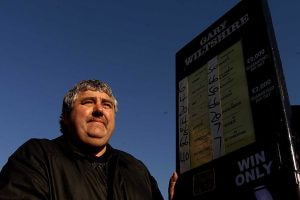talkSport Research Shows the Demise of Football’s Matchday Programmes
Research conducted by the popular sports-related radio station talkSPORT has revealed that 13 football clubs in English football no longer produce a printed matchday programme. In their investigation, 12.5% of clubs across the Premier League, English Football League and Women’s Super League no longer sell physical copies of matchday programmes.

The future of the traditional matchday programme is under threat, according to research conducted by talkSPORT. Football programmes have been produced since 1888 when the Football League was formed, and many supporters still buy a copy of the matchday programme as part of the football experience.
However, the research shows that many clubs, citing a lack of demand, no longer produce printed copies to sell.
Once regarded as a football must-have, high-profile clubs, including Blackburn Rovers, Millwall, Reading, Fleetwood Town, Forest Green Rovers, Wycombe Wanderers, Bradford City and Mansfield Town, have all ceased production.
The buying and selling of matchday programmes can be lucrative. For example, an 1882 FA Cup final programme that featured Old Etonians vs Blackburn Rovers was sold for £30,000 in 2012, the oldest-known publication of a football programme and the same year, a programme from the 1909 FA Cup final between Manchester United vs Bristol City was sold for £23,500. One of the most sought-after programmes is from the World Cup final that was held in England in 1966. As England won that game 4-2, the programme is highly collectable.
More recently, a football programme from Arsenal’s game against Burnley at the Emirates Stadium, Arsene Wenger’s last game in charge of the club after 22 years, sold 100,000 copies.
However, the shift to online media, the knock-on effect of the pandemic and the lack of demand have meant that just 10-20% of attendees now buy them when visiting stadiums. Another factor is that clubs are no longer obliged to produce them after EFL clubs voted against their mandatory production.
The talkSPORT research showed;
- 21% of Championship clubs no longer produce printed matchday programmes
- 12.5% of 104 clubs across the Premier League, EFL and Women’s Super League no longer sell printed copies
- Only 10%-20% of attendees on matchday purchase a programme
Ben Donovan, the Head of Media and Communications at Championship side Swansea, explains: “2011/12 was our first season in the Premier League and [since] our physical programme sales dropped year on year. It started off at about one in four people attending a game at the stadium would buy a programme, but that dropped to one in six or one in seven. We just didn’t feel like it was a commercially viable product for us anymore.”

Swansea and other clubs, such as Bristol and Swansea City, offer fans digital versions of the matchday programme. As Ben states: We just thought it was the best decision to go fully digital because we felt there was more opportunity, and we were able to deliver a far better product.”
The rising costs associated with producing matchday programmes have been cited as one of the driving factors in the shift to online.
Arsenal’s Managing Editor of Publications, Andy Exley, reveals that significant price increases have left clubs in a difficult position. “We’ve been really hit by what’s happened in the print industry. We went from a potential 1% annual increase in print costs to around a 40% increase. At Arsenal, for the first time in eight or nine years, the programmes have gone up from £3.50 to £4. We hate putting the price up, but that has allowed us to keep the programme at the same size.”
Although matchday programmes do not provide the same levels of income that they used to, many clubs still understand the sentimental value that matchday programmes have for supporters who are keen on saving the matchday programme.
Programmes are often popular with visitors to football betting sites as managers often give indications in the programme notes of how they intend to play against the opposition, which isn’t published in other mediums.
Mark Denham, Head of Communications at Cardiff City, says: “Digital media is so throwaway. Nobody talks to their grandkids about a tweet they saw 20 years ago, but they’ll show them their first ever matchday programme and that can’t be ignored. The matchday programme perfectly encapsulates what making memories is about as a football fan. It’s one of those things we really must protect.”
And while sales of programmes are down for a typical match, they can quickly sell out for special occasions such as a local derby, crucial cup games or commemorative editions. For example, Sheffield Wednesday sold every physical copy of their matchday programme when they played Ipswich Town after the club produced a special edition to remember Queen Elizabeth II.
Swindon Town also produced a one-off edition to celebrate the life of the Queen, the Head of Media at the club, Dave Wrixton, said: “As well as attending the game itself and being able to join in with the minute silence and embrace the activities we had on to pay our respects, the programme gave fans the opportunity to take something home with them that they can look at in years to come,”
While an ardent Charlton Athletic fan and editor of the Voice of the Valley fanzine Rick Everitt believes that football programmes are an excellent way for clubs to communicate with fans. “I think that it’s so important that [clubs have] a voice. They should want to produce the programme as an expression of what the club is about and what’s going on because they know fans still want it. There is a future for clubs who do their programme well and who put an effort into it.”

While the sale of football programmes is diminishing in the men’s football game, the rise in the popularity of the women’s game has increased sales of programmes, especially for clubs in European competition.
Arsenal ladies won the European cup in 2007, and after the national team’s success at the Euros in the Summer, they are seeing a surge in supporter numbers and programme sales.
Andy Exley comments: “Demand has increased significantly. Now the crowds have gone up, we’re actually making a profit on the women’s programme. We’re selling a significant amount at Boreham Wood. When we come to the Emirates games, for the Tottenham game, we printed 15,000 programmes, which for a women’s game [is unheard of]. I don’t think we’ve ever printed more than 7,000-8,000 ever.”
Head of talkSPORT Lee Clayon is keen on saving matchday programmes. He comments: “Matchday programmes have always been a classic part of the football ritual, and there’s no doubting the nostalgia that physical copies hold. However, with the challenges clubs are facing today, those making the shift to digital are recognising the need to adapt to a new tech-savvy audience. Clubs need to think smart and recognise the opportunities digital holds, from wider reach to fewer costs. But as some clubs are seeing, there is still a place for physical programmes for special matches or calendar events.”
Clayon concludes: “In one form or another, there will always be a place for this football staple.“



